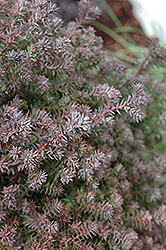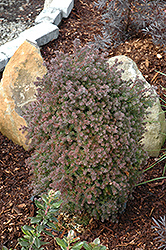Height: 20 feet
Spread: 12 feet
Sunlight:
![]()
Hardiness Zone: 6a
Other Names: Whitecedar Falsecypress, Atlantic White Cedar
Description:
A valuable cultivar with unusual, juniper-like needles; blue needles turn an interesting reddish purple color in fall and through winter; compact columnar shape is ideal for general landscape use
Ornamental Features
Red Star Whitecedar is primarily valued in the landscape for its rigidly columnar form. It has attractive bluish-green evergreen foliage. The scale-like sprays of foliage are highly ornamental and turn brick red in the fall, which persists throughout the winter.
Landscape Attributes
Red Star Whitecedar is a dense multi-stemmed evergreen tree with a narrowly upright and columnar growth habit. It lends an extremely fine and delicate texture to the landscape composition which can make it a great accent feature on this basis alone.
This is a relatively low maintenance tree. When pruning is necessary, it is recommended to only trim back the new growth of the current season, other than to remove any dieback. It has no significant negative characteristics.
Red Star Whitecedar is recommended for the following landscape applications;
- Accent
- Vertical Accent
- Hedges/Screening
Planting & Growing
Red Star Whitecedar will grow to be about 20 feet tall at maturity, with a spread of 12 feet. It has a low canopy, and is suitable for planting under power lines. It grows at a medium rate, and under ideal conditions can be expected to live for 70 years or more.
This tree should only be grown in full sunlight. It is quite adaptable, prefering to grow in average to wet conditions, and will even tolerate some standing water. It is particular about its soil conditions, with a strong preference for sandy, acidic soils. It is somewhat tolerant of urban pollution. Consider applying a thick mulch around the root zone in winter to protect it in exposed locations or colder microclimates. This is a selection of a native North American species.
Disclaimer - This resource is provided for informational purposes only and does NOT reflect current availability. Inventory varies seasonally, so we cannot guarantee that every plant will be in stock at all times - please contact your favourite GardenWorks location directly for current availability. It does not include our entire inventory of plants, so be sure to visit GardenWorks to see varieties that may not be represented on this list.


